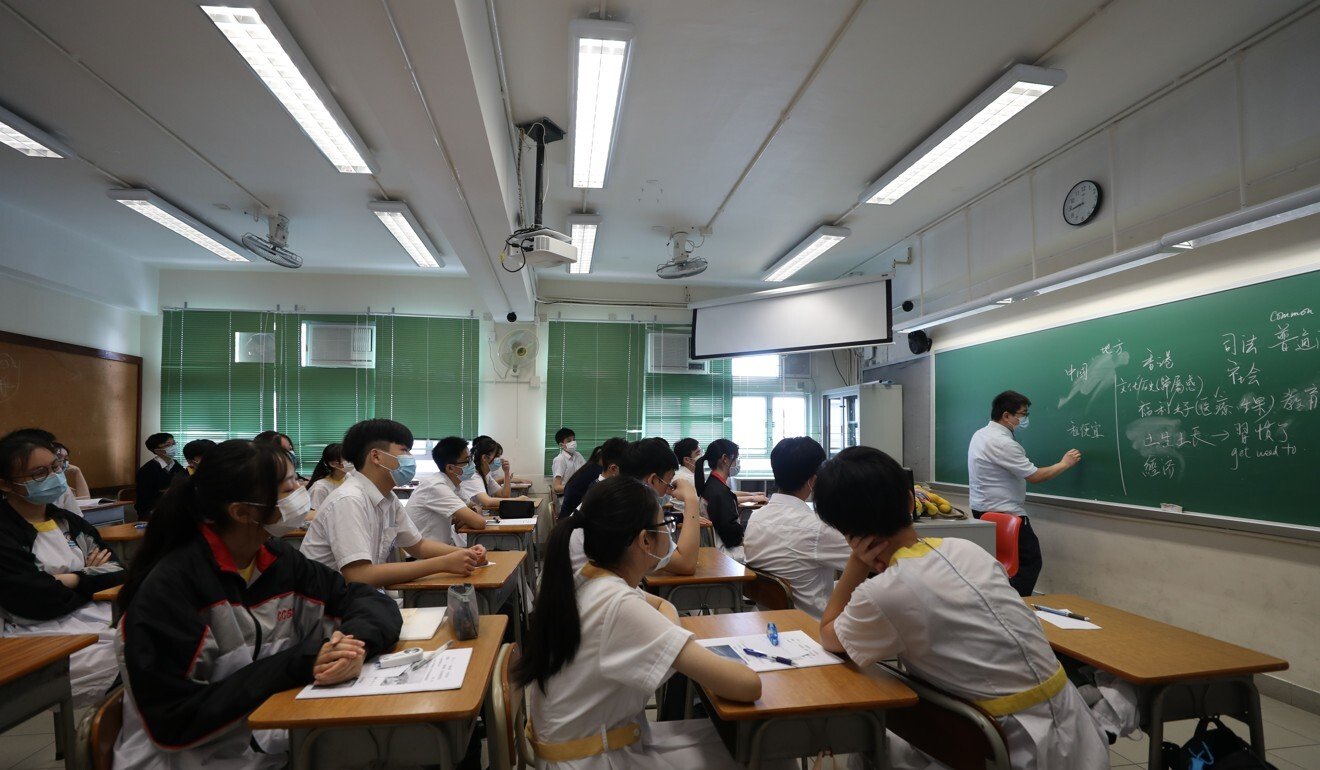
Coronavirus: new single-jab guidance for Hong Kong youth will open door for more face-to-face school classes
- Professor Lau Yu-lung says government can begin recognising pupils as fully vaccinated after just one jab, making 70 per cent inoculation target easier to hit
- City confirms no new Covid-19 cases for first time in two weeks
Professor Lau Yu-lung, chairman of the Scientific Committee on Vaccine Preventable Diseases, which is behind the recommendation, on Thursday predicted a more widespread return to school as health authorities began giving new guidance to teenagers arriving at inoculation centres for their second jabs.
Hong Kong confirmed that there were no new Covid-19 cases on Thursday, leaving the official tally at 12,149 infections, with 213 related deaths. The city last reported zero infections two weeks ago on September 2.
Under the new Education Bureau policy, schools that have 70 per cent of teaching staff and students aged 18 or above fully vaccinated, and 70 per cent of pupils aged between 12 and 17 at least single-jabbed, would be allowed to host full-day classes on campus.
Those in that age group given one dose could also take part in non-academic activities on campus, even if their schools as a whole did not meet the reopening requirement.
Education chief Kevin Yeung Yun-hung revealed on his Facebook page that, as of Thursday, 11 schools had applied to resume full-day, in-person classes for certain cohorts, with two already introducing the new arrangements this week and the rest doing so between next Monday and October 4.
Lau told a radio programme that local data spanning the three months since the threshold age for vaccinations was lowered in June showed a higher incidence rate of the heart condition, at one in several thousand, than the one in every 20,000 or 30,000 people reported in the United States.
One possible explanation for that discrepancy, Lau suggested, was that fewer US residents with the condition went to see a doctor, given hospitals there were overwhelmed with Covid-19 patients.
Experts recommend adolescents receive only one dose of BioNTech vaccine
So far, Hong Kong has seen 37 cases of myocarditis and pericarditis in minors – conditions involving inflammation of tissues around the heart that were typically temporary – following vaccination, but generally only after the second dose.
All but five of the patients were boys, and seven developed the conditions after their second dose.
More than 218,000 youngsters aged 12 to 19 have received their second BioNTech vaccine shot while 275,000 have had at least one dose. A total of 4.37 million people in the city received at least one jab.
The chances of developing the conditions after just one dose were 80 per cent lower than they were for two, Lau said.

Lau also said he had spoken to education officials about the implications of the new scientific advice, adding that more schools could soon host students for full-day classes on campus, once authorities officially counted those with one jab as fully vaccinated.
“The government can also deem single-jabbed students as fully vaccinated when considering arrangements for resuming face-to-face classes,” he said.
Schools suspended in-person classes or held half-day sessions after the health crisis emerged in January last year. The government last month announced they could resume full-day classes for a year group if 70 per cent of pupils in that level were fully vaccinated.
Hong Kong chef, 35, revealed as winner of HK$10.8 million flat in vaccination lottery
The move only covers older children, as Hong Kong does not allow those younger than 12 to receive shots.
University of Hong Kong infectious diseases expert Dr Ho Pak-leung said young people should still be given the option of receiving two doses of BioNTech vaccine, in case they needed to travel to high-risk places or were immunocompromised.
Dion Chen, chairman of Hong Kong Direct Subsidy Scheme Schools Council, said the new policy could bring forward full reopening in many schools by at least three weeks – the recommended time gap between the first and second jab – from the expected start in late October, to early next month.
“Vaccination rates will also go up as parents and pupils will feel reassured that the worst side effects will now be mitigated against by not having to take the second shot,” Chen added.
Scientia Secondary School in Ho Man Tin was one of those meeting the 70 per cent bar across Form 5 and 6 when the new policy kicked in, its principal said.
Henry Tong Sau-chai, who was chairman of the committee on home-school cooperation and a parent of a secondary school pupil, welcomed the decision and said it would help many students in their preparations for public exams and ensure others had access to a full educational experience.
On the radio show, Lau also said the Hong Kong Children’s Hospital had set up a dedicated service for long-term monitoring of the mild adolescent cases of post-vaccination myocarditis and pericarditis.
Asked whether students studying overseas where the Covid-19 situation was more severe should get a second jab in Hong Kong, Lau said while such calls were justified the decision should be left to individuals.
The MTR Corporation, meanwhile, said on Thursday it would require Covid-19 vaccination for staff in a phased approach, beginning with those who regularly interacted with passengers, customers and contractors – covering more than half of the rail operator’s workforce.
Unvaccinated staff would need to take the first dose either on or before October 31, or by December 31. Those who choose not to get the shot will need to undergo Covid-19 testing every two weeks.
The rail operator will pay for those who are medically unsuitable for vaccination to undergo screening.
